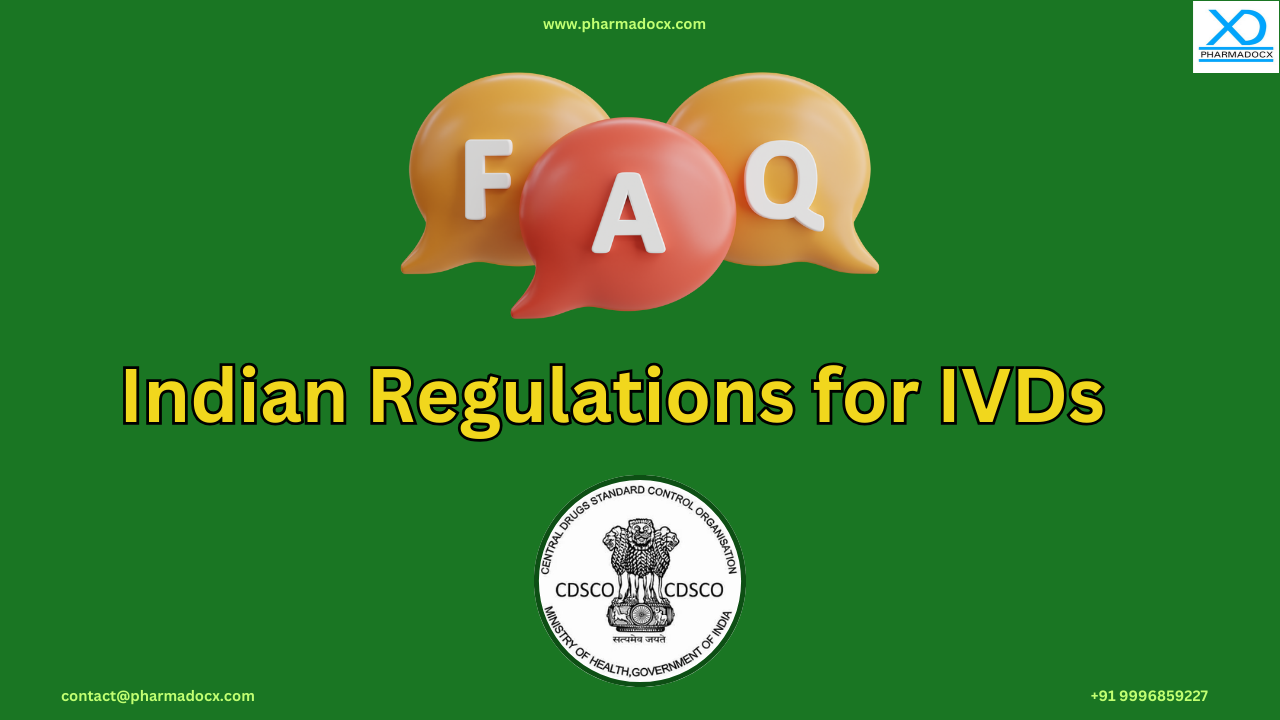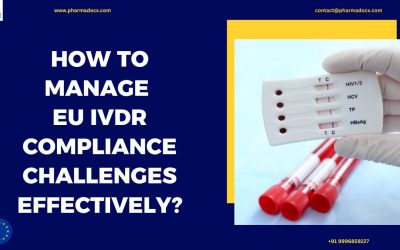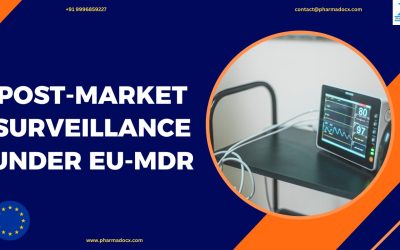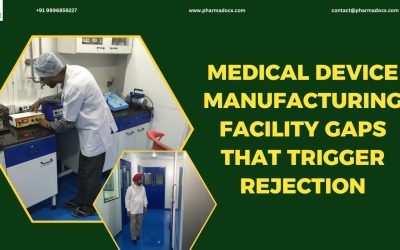Invitro diagnostic devices have a vital role in the healthcare industry. Thus, the invitro diagnostic devices in India are stringently regulated to ensure patient safety. However, the Indian regulations for IVDs are confusing. Hence, we have curated some common queries regarding the Indian IVD regulations.
Frequently asked questions regarding Indian regulations for IVDs
1. What are IVDs?
In vitro diagnostics (IVDs) are tools/devices used to test biological specimens (blood, tissues, or urine) to evaluate an individual’s health. They are used to detect the presence of a disease, infection, or medical condition. IVDS are used to perform tests on biological samples outside the human body. Moreover, these devices cannot be used to treat patients but are used to determine the functioning of the body. Notably, as opposed to medical devices or pharmaceuticals, these devices never come into direct contact with a person. Some examples of IVDS are HIV tests, blood type identification tests, pregnancy self-test kits, urine test strips, etc.
2. Which regulatory body governs Indian regulations for IVDs?
The Central Drugs Standard Control Organisation (CDSCO), Ministry of Health and Family Welfare, Government of India, FDA Bhavan, ITO, Kotla Road, New Delhi -110002, governs Indian regulations for IVDs. It functions under the purview of Medical Devices Rules, 2017. The CDSCO regulates the import, manufacture, and sale of IVDs in India.
3. What is the need for Indian regulations for IVDs?
Indian regulations for IVDs are in place to ensure patient safety and protect public health. CDSCO invitro diagnostic devices regulations monitor the safety, quality, and efficacy of these devices. Moreover, these regulations ensure manufacturers focus on risk identification and reduction for IVDs. Furthermore, the invitro diagnostic devices should perform as intended for effective healthcare delivery. Notably, Indian IVD regulations have been developed to ensure safe and effective devices reach patients.
4. What is the CDSCO definition for IVDs?
IVDs are tools/substances intended to be used on specimens derived from humans for the diagnosis of any disease or disorder in human beings.
5. Are invitro diagnostic devices in India also governed under Medical Device Rules, 2017?
Yes, both medical devices and IVDs in India are regulated under the provisions of the Medical Devices Rules, 2017. As these devices are used for diagnosis, any regulations applicable to medical devices shall also be applicable to IVDs.
6. What are the CDSCO IVD classes?
CDSCO has categorised IVDs into 4 classes, A, B, C, and D. This risk-based classification system for IVDs has been developed for the ease of IVD CDSCO registration and license application process.
- Class A IVDs are low-risk devices. Examples: Prepared selective media, clinical chemistry analyser, etc.
- Class B IVDs are low to moderate-risk devices. Examples: Urine test strips, pregnancy self-test kits, etc.
- Class C IVDs are moderate-risk devices. Examples: Rubella testing equipment, etc.
- Class D IVDs are high-risk devices. Examples: HIV blood donor screening, HIV blood test, etc.
7. Which division of CDSCO oversees invitro diagnostic devices in India?
The Medical Devices & Diagnostics Division of the Central Drugs Standard Control Organization (CDSCO) regulates and monitors invitro diagnostic devices in India.
8. Are CDSCO invitro diagnostic devices regulations applicable to all IVDs?
Yes, CDSCO invitro diagnostic devices regulations are applicable to all IVDs being manufactured/imported for sale and distribution in India.
7. Are instruments using human or animal specimen for research only regulated under MDR, 2017?
Per Indian IVD regulations, instruments intended for research purpose even if they use human/animal specimen do not fall under the purview of MDR, 2017. As long as the instruments are not being used for in-vitro diagnosis purposes, they are not regulated under MDR 2017.
8. Are microbiological culture media and reagents used for food and water testing regulated under MDR, 2017?
No, microbiological culture media and reagents used for food and water testing are not regulated under MDR, 2017.
9. Which license is required to manufacture IVDs in India, per Indian regulations for IVDs?
Per Indian regulations for IVDs, different licenses are required for different classes of IVDs.
Class A and B IVD devices
- Manufacturing license: The applicant will have to use MD 3 to apply for a license to manufacture, sell, and distribute Class A and B IVD devices in India. The license to manufacture Class A and B IVD devices for sale and distribution in India will be granted under MD 5.
- Loan license: The applicant will have to use MD 4 to apply for a loan license for Class A and B IVD devices. The loan license to manufacture Class A and B IVDs without a manufacturing facility will be granted under MD 6.
Class C and D IVD devices
- Manufacturing license: The applicant will have to use MD 7 to apply for a license to manufacture, sell, and distribute Class C and D IVD devices in India. The license to manufacture Class C and D IVDs for sale in India will be granted under MD 9.
- Loan license: The applicant will have to use MD 8 to apply for a loan license for Class C and D IVD devices. Loan license to manufacture Class C and D IVDs without a facility and factory will be granted under MD 10.
10. Which license is required to import IVDs into India, per Indian regulations for IVDs?
The application for importing Class A, B, C, and D IVDs into India is filed under MD 14. The license to import all CDSCO classes of IVDs into India for sale and distribution is granted under MD-15.
11. What is the purpose of CDSCO test license for IVDs?
CDSCO issues test license to manufacture or import small quantities of IVD for the purpose of clinical investigation/evaluation. Additionally, the license also permits the use of IVDs for demonstration or training purposes.
12. What is the validity period of the CDSCO test license for IVDs in India?
The CDSCO test license for IVDs in India shall be valid for 3 years from the date of issue. It will be valid for this period only if it is not cancelled or suspended.
13. Within how many days can one appeal for the cancellation of suspension of CDSCO test license for IVDs?
Within 45 days of CDSCO test license suspension order, an appeal requesting cancellation of suspension can be made.
14. Can multiple IVD manufacturing sites be mentioned in a single CDSCO IVD test license application?
Yes, multiple IVD manufacturing sites can be incorporated into a single CDSCO IVD test license application.
15. What is the accepted language for the application for CDSCO IVD registration in India?
Per Indian IVD regulations, the officially accepted language for applying for CDSCO IVD registration in India is English. Moreover, all supporting documents for the application should also be in English.
16. What is the mode of CDSCO IVD license application in India?
The mode of CDSCO IVD license application in India is online.
17. Which regulatory authority grants the various licenses for IVDs in India?
Per Indian regulations for IVDs, different authorities are responsible for granting different licenses for different classes of IVDs.
- Central Licensing Authority (CLA): CLA grants manufacturing license for Class C and D IVDs. Moreover, CLA grants test licences for the manufacture or import of all classes of devices. Furthermore, it grants import license for all classes of IVDs. Additionally, CLA grants permits for clinical performance evaluation and approves new devices.
- State Licensing Authorities (SLA): SLA grants manufacturing license for sale or distribution of Class A and B IVDs.
18. Are in-vitro fertilization kits regulated under Indian regulations for IVDs or medical devices?
In India, in-vitro fertilization kits are regulated under the guidelines for medical devices and not those for IVDs.
19. Import, manufacture, sale, distribution, and use of which IVDs are prohibited in India?
Per Indian regulations for IVDs, import, manufacture, sale, distribution, and use of the following IVDs are prohibited in India:
- Antibody detecting rapid diagnostic tests for routine diagnosis of malaria
- Serodiagnostic test kits for diagnosis of tuberculosis
Do you have further queries regarding Indian regulations for IVDs?
Our team of experts at Pharmadocx Consultants will be more than happy to answer all your queries. Send your queries regarding Indian regulations for IVDs to [email protected] or call/Whatsapp on 9996859227.





